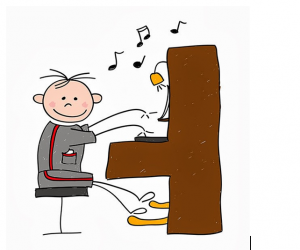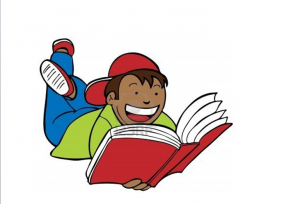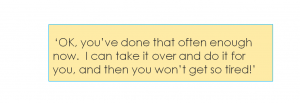
The Daily Yawn
Does your young child come home exhausted from school most afternoons? Reluctant to talk about his day, does he flop in front of the TV. When you ask about his reading book is he vague, and hostile to the idea of reading practice? In contrast, are his classmates galloping through the reading scheme, three colours ahead of him?
It doesn’t have to be like this! Learning to read is easy!
Why is your child Exhausted?
The obvious answer to this question is that he is young, and learning is very tiring. There is nothing unusual about a young child ‘flopping in front of the TV after school’.
However, you find yourself wondering what he has been doing at school, to make him so tired. After all, he doesn’t appear to be making any progress. He’s especially reluctant to read!
It is possible that he has been working really hard. He has been trying to remember lots of spelling rules, to learn about digraphs, split vowels and magic ‘e’. He may also have been reciting a ditty (a mnemonic or memory aid), to help him spell ‘because’.
 Big Elephants can always use small envelopes = BECAUSE!!!
Big Elephants can always use small envelopes = BECAUSE!!!
However, none of this has improved his reading! In fact, he probably wonders why he has learnt all this stuff, because the reading book he is given has lots of other problem words, for which he has no ditty or rule.
Education Psychologists often comment in their reports that children ‘over-apply phonological rules’, or have a ‘preoccupation with mnemonics’. This is just another way of presenting this problem, a problem that is so easy to overcome.
What’s wrong with phonological rules & mnemonics?
Learning lots of theory about how English words are constructed doesn’t help reading. Theory and rules aren’t a lot of use for spelling either, because most rules are broken too frequently. However, they might explain why your child is exhausted.
Rules may play a small part in the reading process for some children. But there is a more efficient way of learning to read, which would include playing with the sounds in our language and when appropriate, doing lots of reading.

Think of a child learning to play the piano. He may use mnemonics (memory aids) to help him remember information about the keys. New words like ‘stave’, ‘quaver’ and ‘allegro’ will have to be learnt, but what does he do most of all? He Practises playing the piano!
Maybe your child needs to practise playing with reading, rather than worry about rules, mnemonics and learning ditties? It’s much more fun!
What happens when rules and mnemonics are over applied?
Learning theory and rules also forces a child to constantly ‘think’ about reading. He will be trying to apply the rules he has learnt, to remember the ditties, and ponder on split vowels or digraphs, probably with little success.
Your child is, in effect, intellectualising reading, doing more and more thinking and remembering, without experiencing any improvement in his reading performance.
Think about how you learnt to drive. How useful would it have been for you to sit in the car and memorize which pedal is the brake, or how to move the gear stick? This would have made you feel very anxious about how much you had to learn.

Instead, your instructor sat you in a car and told you to do it! And you practised. Think how quickly you learnt and felt good about yourself! Try putting your car into first gear, while consciously thinking about what you have to do. You might find it harder than you think!
Now you may be able to understand why your child is getting exhausted; worrying constantly about all the things he has to remember and why he is not keeping up with the other children. Worry is exhausting too.
How do other children learn to read so easily?
I cannot fully answer this question. What I have learnt from my own experience and from the children I teach, is that we struggling readers seem to struggle, because we think differently. We find math easier; we prefer technical challenges and graphic design. And we love computers! We like problem solving and we are very literal. That’s why we hate meaningless ditties, and rules that get broken!
Children who seem to find reading easy, are happy to learn rules and mnemonics and maybe they improve what they can already do, which is to be able to read. They have easily acquired the skill of reading. What this means is that their Motor Sensory Brain is doing the work for them and they are loving the stories they are reading.

What’s the Brain up to?
Reading for an effective reader takes place mostly in the Motor Sensory Brain. This is the part of your brain which operates your body, mostly out of reach of your conscious awareness. It also accommodates all the skills you learn and which you seem to do ‘automatically’ like riding a bike, hitting a ball and just walking around.
What do we mean by ‘automatically’?
In fact, you are thinking about each of these skills as you do them, but your Motor Sensory Brain has simply said to your conscious brain: Think how difficult you found it to change gear when you started driving. Now you can change gear, listen to the radio and shout at the kids, all at the same time!
Think how difficult you found it to change gear when you started driving. Now you can change gear, listen to the radio and shout at the kids, all at the same time!
Reading is a skill, and you can assume that your motor sensory brain is now effective at reading, which enables you to read and comprehend this. You are thinking only about the content and not how you read each word.
Your struggling child, however, may be consciously thinking about each word, when he tries to read, trying to apply the rules he has learnt. No wonder he is exhausted, and has no idea what he has just read!
I once asked my struggling 7-year-old grandson to read a page of ‘Horrid Henry’.

When he had limped through several paragraphs, I asked him a simple question about the story. His reply didn’t surprise me:

Clearly, his focus was still on working out each word. He didn’t have time to consider the story. No wonder he said he didn’t like reading!
How do you move your child’s reading into his Motor Sensory Brain?
How did you learn to ride a bike, change gear, wash-up or ice-skate? By rote learning rules? No! You went out and did these activities over and over again, until you could ‘forget’ about how you were doing them and start to enjoy them.
That’s how you can help your child’s reading. You can do activities with him that are easy, can be repeated frequently, and which are fun. And you will do them over and over again, without him noticing, because they will appear different. If they are creative, even better!
You may have to put away the reading book for a few weeks, because he has lost faith in his ability. This is the time when you can continue to read to him, including his school reading book!
What are you going to do instead of reading?
Play with sounds! Written language is, in effect, encoded sounds. Letters are symbol which are used to represents the sounds in words. The more familiar your child becomes, with the symbols in words, the easier reading will be. Look at my blog posts on small words, for more information.
How will you do this?
You can play ‘Listening Fingers’, Listening Hands, Sound Shuffle or Bingo. Get out the big coloured pens and sticky notelets and have fun!

All these activities will develop the skills your child needs to learn to read. Constantly practising these skills, will help his motor sensory brain take over the reading process. How much easier and more fun that will be?
All this theory and practise is detailed in my book:
Next Blog: Helping Children with poor Auditory Processing Skills